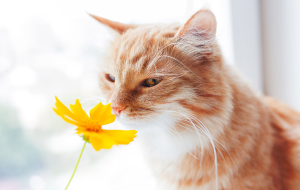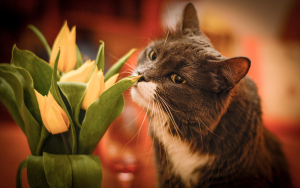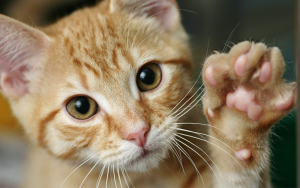Why Does My Cat Lick My Face? Understanding the Reasons Behind This Behavior

As cat owners, we are often surprised by the curious and sometimes perplexing behavior of our feline friends. One behavior that frequently catches cat owners off guard is when their cat licks their face. While this may seem odd or even a bit off-putting
to some, it’s actually a normal and common behavior that can have various meanings. If you’re wondering why your cat licks your face, you’re not alone. In this article, we will explore the possible reasons behind this behavior and what it might mean
for your relationship with your pet.
Understanding Cat Behavior: A Glimpse into Their World
Before we dive into the specifics of face-licking, it’s essential to understand that cats communicate in different ways than humans. Unlike dogs that often exhibit clear signs of affection, cats can be more subtle in their expressions. A lick is just
one of many ways your cat might show love, seek attention, or express their emotions.
Cats are also highly sensory animals. They experience the world around them through their keen sense of smell, taste, and touch. So, when a cat licks your face, they might be doing it for a variety of reasons that go beyond just affection.
1. Expression of Affection
One of the most common reasons cats lick their owners is as a form of affection. Cats are known to groom each other as a sign of care and bond-building. In the wild, cats will lick each other to clean hard-to-reach areas and to maintain social bonds.
When your cat licks your face, they may be treating you as a fellow feline, showing their affection in the only way they know how.
This is especially true if your cat follows you around, sits on your lap, or snuggles with you. These behaviors indicate that your cat has formed a bond with you and may see you as part of their family or social group.
2. Grooming Behavior: A Sign of Trust
Licking is also a grooming behavior, and it plays a significant role in how cats show trust. When a cat licks your face, it may be attempting to clean you as a sign of trust and care. Cats are fastidious groomers, and they often take it upon themselves
to maintain their hygiene. If your cat licks your face, it could be their way of helping you stay clean in a way that mimics how they would groom other cats in their social circle.
Trust is a key factor here. Cats are more likely to engage in grooming behavior with individuals they trust. If your cat feels comfortable enough to lick your face, it’s a sign that they view you as a trusted member of their social group.
3. Seeking Attention or Interaction
Another reason your cat might lick your face is to get your attention. Cats are incredibly smart and can learn how to communicate their needs effectively. If your cat knows that licking your face gets a reaction—whether positive or negative—they might
engage in this behavior to prompt you to pet them, feed them, or simply interact.
If you’ve ever noticed your cat licking your face and then purring loudly or meowing shortly afterward, they may be trying to initiate playtime or some other form of interaction. In this case, your cat may see face-licking as a way of saying, “Hey, I
need some attention!”
4. Cat Behavior in Kittens: Mimicking Their Mother
If your cat is a kitten or a young adult, face-licking can also be a learned behavior from their mother. In the early stages of life, kittens rely heavily on their mother for grooming, feeding, and comfort. Kittens learn to lick their mother’s face as
part of the grooming process, and as they grow older, they may continue this behavior with their human caregivers. Licking your face can be their way of replicating this early bond-building activity.
For kittens, licking is also a sign of comfort and security. If your cat licks your face during stressful moments or when they are feeling anxious, it could be a form of self-soothing learned from their early experiences.
5. Scent Marking and Territory
Cats are territorial creatures, and they often mark their territory with scents from glands located on their face, paws, and tail. When your cat licks your face, they might be marking you with their scent, signaling that you are part of their territory.
This behavior is more likely to occur with cats that have a strong bond with their owners, as they want to make sure other animals understand that you belong to them.
It’s a way for your cat to claim you as their own. If your cat is particularly attached to you and wants to establish a sense of ownership, licking can be a form of scent-marking.
6. Stress or Anxiety Relief
Licking can also be a coping mechanism for cats who are feeling stressed or anxious. Just like humans might bite their nails or pace when nervous, cats may lick to calm themselves down. If your cat licks your face during moments of stress or change in
their environment (such as moving to a new home or the introduction of a new pet), this may be their way of seeking comfort.
Some cats may lick as a form of self-soothing. The repetitive motion of licking releases endorphins, which can help calm the cat down. If your cat is particularly anxious, licking your face might be an attempt to reduce their own stress levels while also
seeking reassurance from you.
7. Hunger or Thirst
Sometimes, a cat licking your face could be related to hunger or thirst. Cats are creatures of habit and can develop a routine around mealtime. If your cat has learned that licking your face gets your attention at a certain time of day, they may do so
as a subtle reminder that it’s time for a meal. This can be especially true if your cat is particularly vocal or insistent about their feeding schedule.
If you’ve noticed that your cat tends to lick your face just before or after their usual feeding time, hunger or thirst might be the cause.
8. Medical Issues: When Licking Becomes Excessive
In rare cases, excessive licking can indicate a medical issue. If your cat is licking your face excessively or appears to be doing so out of the ordinary, it may be a sign of an underlying problem. Conditions like dental issues, nausea, or other health
problems could cause your cat to engage in this behavior more than usual.
If the licking seems compulsive or if your cat displays other unusual symptoms, it’s important to consult a veterinarian. They can rule out any potential health problems that may be contributing to the behavior.
How to Respond to Your Cat’s Face Licking
While face-licking is generally harmless and even affectionate, it’s essential to set boundaries with your cat if this behavior becomes disruptive or uncomfortable. Here are a few tips on how to handle face-licking:
-
Don’t Encourage Overly Frequent Licking: If you’re not comfortable with your cat licking your face, gently discourage it by moving away when they attempt to do so.
-
Redirect Their Attention: If your cat is licking your face for attention, try redirecting them to another activity, such as playing with a toy or offering a treat.
-
Observe for Signs of Anxiety: If your cat’s licking is linked to stress or anxiety, try to address the underlying cause. Providing a calm and safe environment can help alleviate their nervousness.
-
Consult a Veterinarian if Necessary: If the licking seems excessive or is accompanied by other symptoms, don’t hesitate to visit your vet.
Conclusion: A Unique Expression of Affection
In the end, when your cat licks your face, it’s usually a sign that they are expressing affection, trust, and care. It’s their way of showing that they view you as a part of their family. Whether it’s a form of grooming, a plea for attention, or simply
a comfort-seeking behavior, it’s a unique and intimate form of communication between you and your cat.
Understanding the reasons behind your cat’s behavior can deepen the bond you share and help you respond in ways that are both loving and respectful of your pet’s needs. The next time your feline friend licks your face, remember that it’s a sign of affection,
trust, and the special connection you have with each other.
As cat owners, we are often surprised by the curious and sometimes perplexing behavior of our feline friends. One behavior that frequently catches cat owners off guard is when their cat licks their face. While this may seem odd or even a bit off-putting
to some, it’s actually a normal and common behavior that can have various meanings. If you’re wondering why your cat licks your face, you’re not alone. In this article, we will explore the possible reasons behind this behavior and what it might mean
for your relationship with your pet.
Understanding Cat Behavior: A Glimpse into Their World
Before we dive into the specifics of face-licking, it’s essential to understand that cats communicate in different ways than humans. Unlike dogs that often exhibit clear signs of affection, cats can be more subtle in their expressions. A lick is just
one of many ways your cat might show love, seek attention, or express their emotions.
Cats are also highly sensory animals. They experience the world around them through their keen sense of smell, taste, and touch. So, when a cat licks your face, they might be doing it for a variety of reasons that go beyond just affection.
1. Expression of Affection
One of the most common reasons cats lick their owners is as a form of affection. Cats are known to groom each other as a sign of care and bond-building. In the wild, cats will lick each other to clean hard-to-reach areas and to maintain social bonds.
When your cat licks your face, they may be treating you as a fellow feline, showing their affection in the only way they know how.
This is especially true if your cat follows you around, sits on your lap, or snuggles with you. These behaviors indicate that your cat has formed a bond with you and may see you as part of their family or social group.
2. Grooming Behavior: A Sign of Trust
Licking is also a grooming behavior, and it plays a significant role in how cats show trust. When a cat licks your face, it may be attempting to clean you as a sign of trust and care. Cats are fastidious groomers, and they often take it upon themselves
to maintain their hygiene. If your cat licks your face, it could be their way of helping you stay clean in a way that mimics how they would groom other cats in their social circle.
Trust is a key factor here. Cats are more likely to engage in grooming behavior with individuals they trust. If your cat feels comfortable enough to lick your face, it’s a sign that they view you as a trusted member of their social group.
3. Seeking Attention or Interaction
Another reason your cat might lick your face is to get your attention. Cats are incredibly smart and can learn how to communicate their needs effectively. If your cat knows that licking your face gets a reaction—whether positive or negative—they might
engage in this behavior to prompt you to pet them, feed them, or simply interact.
If you’ve ever noticed your cat licking your face and then purring loudly or meowing shortly afterward, they may be trying to initiate playtime or some other form of interaction. In this case, your cat may see face-licking as a way of saying, “Hey, I
need some attention!”
4. Cat Behavior in Kittens: Mimicking Their Mother
If your cat is a kitten or a young adult, face-licking can also be a learned behavior from their mother. In the early stages of life, kittens rely heavily on their mother for grooming, feeding, and comfort. Kittens learn to lick their mother’s face as
part of the grooming process, and as they grow older, they may continue this behavior with their human caregivers. Licking your face can be their way of replicating this early bond-building activity.
For kittens, licking is also a sign of comfort and security. If your cat licks your face during stressful moments or when they are feeling anxious, it could be a form of self-soothing learned from their early experiences.
5. Scent Marking and Territory
Cats are territorial creatures, and they often mark their territory with scents from glands located on their face, paws, and tail. When your cat licks your face, they might be marking you with their scent, signaling that you are part of their territory.
This behavior is more likely to occur with cats that have a strong bond with their owners, as they want to make sure other animals understand that you belong to them.
It’s a way for your cat to claim you as their own. If your cat is particularly attached to you and wants to establish a sense of ownership, licking can be a form of scent-marking.
6. Stress or Anxiety Relief
Licking can also be a coping mechanism for cats who are feeling stressed or anxious. Just like humans might bite their nails or pace when nervous, cats may lick to calm themselves down. If your cat licks your face during moments of stress or change in
their environment (such as moving to a new home or the introduction of a new pet), this may be their way of seeking comfort.
Some cats may lick as a form of self-soothing. The repetitive motion of licking releases endorphins, which can help calm the cat down. If your cat is particularly anxious, licking your face might be an attempt to reduce their own stress levels while also
seeking reassurance from you.
7. Hunger or Thirst
Sometimes, a cat licking your face could be related to hunger or thirst. Cats are creatures of habit and can develop a routine around mealtime. If your cat has learned that licking your face gets your attention at a certain time of day, they may do so
as a subtle reminder that it’s time for a meal. This can be especially true if your cat is particularly vocal or insistent about their feeding schedule.
If you’ve noticed that your cat tends to lick your face just before or after their usual feeding time, hunger or thirst might be the cause.
8. Medical Issues: When Licking Becomes Excessive
In rare cases, excessive licking can indicate a medical issue. If your cat is licking your face excessively or appears to be doing so out of the ordinary, it may be a sign of an underlying problem. Conditions like dental issues, nausea, or other health
problems could cause your cat to engage in this behavior more than usual.
If the licking seems compulsive or if your cat displays other unusual symptoms, it’s important to consult a veterinarian. They can rule out any potential health problems that may be contributing to the behavior.
How to Respond to Your Cat’s Face Licking
While face-licking is generally harmless and even affectionate, it’s essential to set boundaries with your cat if this behavior becomes disruptive or uncomfortable. Here are a few tips on how to handle face-licking:
-
Don’t Encourage Overly Frequent Licking: If you’re not comfortable with your cat licking your face, gently discourage it by moving away when they attempt to do so.
-
Redirect Their Attention: If your cat is licking your face for attention, try redirecting them to another activity, such as playing with a toy or offering a treat.
-
Observe for Signs of Anxiety: If your cat’s licking is linked to stress or anxiety, try to address the underlying cause. Providing a calm and safe environment can help alleviate their nervousness.
-
Consult a Veterinarian if Necessary: If the licking seems excessive or is accompanied by other symptoms, don’t hesitate to visit your vet.
Conclusion: A Unique Expression of Affection
In the end, when your cat licks your face, it’s usually a sign that they are expressing affection, trust, and care. It’s their way of showing that they view you as a part of their family. Whether it’s a form of grooming, a plea for attention, or simply
a comfort-seeking behavior, it’s a unique and intimate form of communication between you and your cat.
Understanding the reasons behind your cat’s behavior can deepen the bond you share and help you respond in ways that are both loving and respectful of your pet’s needs. The next time your feline friend licks your face, remember that it’s a sign of affection,
trust, and the special connection you have with each other.







